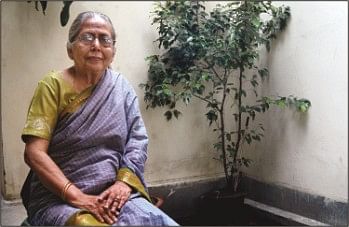Down memory lane with Mahbuba Rahman

Mahbuba Rahman. Photo: Mumit M
Mahbuba Rahman with her golden voice captured many a heart in '50s and '60s in the then East Pakistan. She made her mark in the radio, television and films and received accolades, particularly for her debut playback in the first Bangla film made here, “Mukh O Mukhosh” (1955).
In recognition to her contribution as an artiste, Rahman received the Ekushey Padak (in 1998) and the Golden Jubilee Film Audience award (2006) for Best Singer.
The otherwise reticent Mahbuba recently spoke to The Daily Star about her past and present:
The Daily Star (TDS): Are you still involved with the music industry?
Rahman: Right now my world revolves around my son, daughter, and grandchildren. My present priorities are to spend time with them, listen to music and read novels. I quit the music industry long ago.
TDS: Were you always musically inclined?
Rahman: Yes, of course. I began singing when I was only eight-years-old.
TDS: Tell us about your first recording experience...
Rahman: It was a remarkable experience. The recording was at All India Radio (in 1946). I was nervous but music composer Samar Das and my mentor Shambhu Pal were there to encourage me.
TDS: Some of your memorable songs...
Rahman: “Agun jalaish na amar gaye” from the film “Saat Bhai Champa”; “Amar mon bhalo na go pran bhalo na” an adhunik song; “Moner bon-e dola lagey” from the film “Shurjo Snan” and “Amar golar har” from the film “Aasia” were big hits. Though initially I started with Nazrul Sangeet, I gradually shifted to bhajan, kirtan and much later to folk songs.
TDS: Who were your main sources of inspiration?
Rahman: When I was a child, my maternal uncle took me to a local music school in Chittagong. Apart from him, my parents were major sources of inspiration. My husband, eminent music composer Khan Ataur Rahman had always been supportive of my career. Without his encouragement, I could not have come this far.
TDS: Who was your role model?
Rahman: I was greatly influenced by my contemporaries Anjali Roy and Afsari Khanum.
TDS: What are your views on the current trends in music?
Rahman: There is a huge difference between music back then and now. In our time, the vocalist was considered the focus, but now instruments get the limelight. However, I do see this in a positive light. The world is progressing by leaps and bounds and we should also do so. Having said that, inane lyrics do not stand the test of time.

 For all latest news, follow The Daily Star's Google News channel.
For all latest news, follow The Daily Star's Google News channel. 



Comments